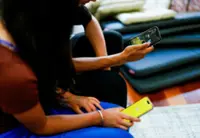ITU estimates that around 2.6 billion people worldwide remain offline and unable to access the benefits of digital technology. — Image by jannoon028 on Freepik
GENEVA: The UN telecoms agency chief warned March 7 of the toll artificial intelligence could take on societies, but said her greatest concern remains the huge number of people without access to digital technologies.
The International Telecommunications Union (ITU) estimates that around 2.6 billion people worldwide remain offline and unable to access the benefits of digital technology.
“They have never, ever connected to the Internet,” agency chief Doreen Bogdan-Martin told reporters in Geneva.
That, she said, is "what keeps me up at night ... because if you're not part of the digital world, then you're not part of the AI world".
"This is really one of the biggest challenges of our generation."
The United Nations is aiming to raise US$100bil (RM469.15bil) by 2026 towards bridging the global digitalisation gap.
Bogdan-Martin estimated though that more than four times that amount was needed to truly bridge the divide.
The yawning gap will be felt ever more acutely with the spread of rapidly evolving generative AI technology, the UN official said.
Bogdan-Martin pointed to the many ways AI could transform societies, including boosting the fight against climate change and poverty, while improving education and health care.
But while there are "incredible opportunities", she warned that "there are risks, and we need to be able to manage and mitigate the risks".
In a busy year of high-stake elections around the world, she cautioned that "emerging technologies like artificial intelligence can be used to erode trust in our elections, in our institutions".
It can also, she said, "threaten our jobs, our privacy, and I think also our very future."
Speaking a day before International Women's Day, she highlighted the "huge" gender bias found in the algorithms used by the world's most popular AI tools.
A study published Thursday by the UN cultural agency UNESCO found that algorithms used by OpenAI and Meta showed "unequivocal evidence of prejudice against women".
Bogdan-Martin, the first woman to serve as ITU secretary-general in the organisation's nearly 160-year history, said a major problem was that "women are less connected (and) women are less represented in this sector".
Women make up "a disproportionate" share of the offline population and "there are not enough women in STEM (science, technology, engineering, and math), there are not enough women in AI, there are not enough women in quantum, not enough women in space".
"When it comes to the data, the algorithms, we need to have more women at the table."
In particular, she said, "we need to get more women in AI, like, now". – AFP





